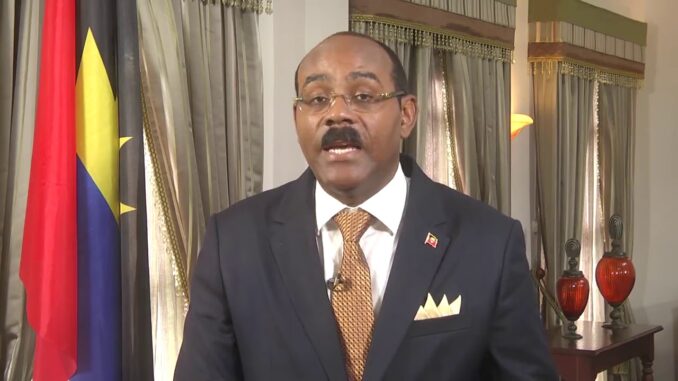
CARICOM Chair praises creation of regional institutions; wants Community to ‘Breathe Again’
As the Caribbean Community (CARICOM) continues to confront challenges on several fronts, Chairman, Prime Minister Gaston Browne, is lauding the establishment of several institutions which are at forefront of the Region’s responses.
In an address to the opening of the Forty-Second Meeting of the Conference of Heads of Government of CARICOM on Monday 5 July, the Antigua and Barbuda Prime Minister spoke of the convergence of economic, social, environmental, financial and health “storms” which the Community faced. The challenge, he said, threatened the very survival of the Region and underscored its vulnerability.
He was speaking against the backdrop of the recent passage of Hurricane Elsa through the Region, the eruption of La Soufriere volcano in St. Vincent and the Grenadines, devastating floods in Guyana and Suriname, and the widespread impact of the COVID-19 pandemic.
The last 16 months, the Prime Minister said, have shown the wisdom of establishing regional institutions such as the Caribbean Public Health Agency (CARPHA), the Caribbean Disaster Emergency Management Agency (CDEMA), the Regional Security System (RSS) and the CARICOM Implementation Agency for Crime and Security (CARICOM IMPACS). Along with The University of the West Indies (The UWI) and the CARICOM Secretariat, they “have served this Region so well in dealing with the health aspects of the pandemic,” he said.
Breathe Again
The Community’s recovery from the pandemic will depend on creative and innovative solutions and will test the strength of “our will” to work together to prevent economic collapse.
“The collective approach that served us so well in managing the outbreak of the pandemic in our Region must be translated to the economic sphere, so that we will not only survive this test, but thrive and emerge stronger,” said the CARICOM Chairman.
He pointed out that it was important for the Region to resume a level of normalcy through economic activity and increased movement of people.
“It is vitally important for our economies to breathe again, for jobs to be retained, for our children to resume their education and for something resembling a normal life to begin to return to our businesses, our hotels, our schools, our farms and all aspects of our lives.
“In our tourism-based economies, the resumption of intra-regional travel is one key element in getting economic activity back to normal. Increased movement of people within our community would be a major boost to our economies in seeking to rebound.
He called for the establishment and widely communicated harmoninsed regional health protocols for travel; and for an enabling environment to be created for air transport “to grow our tourism sector back to good health”.
The Caribbean is heavily dependent on tourism for economic wellbeing. Prime Minister Browne used the opportunity to urge his colleague Heads of Government to consider the acceleration of efforts towards economic diversification, especially in agriculture.
The possibilities of the Region’s agriculture sector and agro-processing industry were limitless, he said, warning that no country could be considered great if it could not feed itself “and this could be extended to our community”.
Food and nutrition security was achievable, with the nutrition element being vital in the battle against non-communicable diseases, he said.
“The Nassau Declaration that health of the Region is the wealth of the region still applies. It was CARICOM that brought the attention of the world to the plague of NCDs and we must maintain our leadership in this matter of life and death.
“I believe that, like the CSME and Crime and Security, the health of our Region’s people, must be a permanent item on the agenda for meetings of the Conference,” the CARICOM Chair said.
Photo: Antigua and Barbuda Prime Minister Gaston Browne (CARICOM Chairman)
Michelle Nurse


